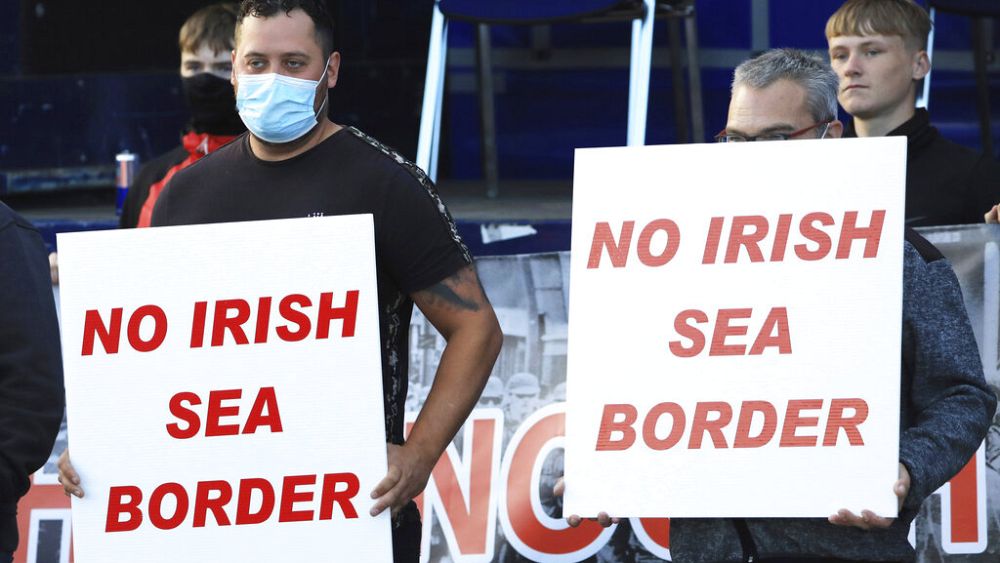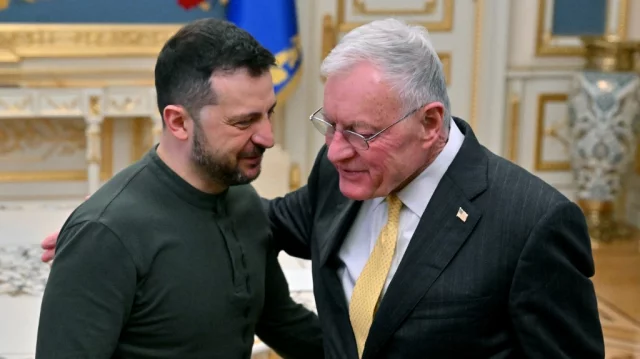
It started as a “sausage war” over chilled meat exports — now it is threatening to escalate into a long-term confrontation between the United Kingdom and the European Union.
At the heart of the rift is the Northern Ireland Protocol, which was agreed by the EU and the UK as part of their Brexit divorce treaty. It deals with a territory that is part of Britain but has to keep an open land border with the Republic of Ireland, an EU member.
The protocol keeps Northern Ireland subject to many EU trade rules, including checks on goods.
But the arrangement has a caused tensions with Northern Ireland’s unionists, who say it amounts to a border in the Irish Sea that weakens ties to the rest of Britain, as well creating shortages.
The EU insists it won’t renegotiate the Northern Ireland protocol, while the UK is adamant that the trading rules the government negotiated with the EU “cannot go on.”
“It’s a stalemate,” said David Henig, UK director at the European Centre for International Political Economy, to describe London and Brussels’ post-Brexit trade disputes over Northern Ireland — and their unsuccessful bids to solve them.
On Monday, the UK rejected proposals from the EU to overcome their trade spat regarding the movement of medicines, livestock and animal products with Northern Ireland.
With both sides digging their heels in, what are the options going forward?
Euronews explores if and how London and Brussels can break the current deadlock over the Northern Ireland Protocol.
What is the Northern Ireland Protocol?
The Northern Ireland Protocol agreed by the European Union and the United Kingdom as part of their Brexit deal demands that checks be carried out on certain goods travelling between Great Britain and Northern Ireland.
The British province has remained inside the EU’s customs union in an effort to protect the Good Friday Agreement that put an end to decades of sectarian violence, effectively creating a border in the Irish Sea.
But inspections and red tapes have resulted in shortages of some goods.
The arrangement has also shaken the delicate political balance in Northern Ireland — where some people identify as British, others as Irish.
The unionist community is angered by the protocol which they say weakens ties with the rest of the UK.
Anton Spisak, Policy Lead for Trade and Productivity at the Tony Blair Institute, told Euronews that the protocol was “an imperfect and flawed compromise.”
“The UK side signed up to it either because it didn’t fully realise the consequences of the protocol or it didn’t care about those consequences,” he explained.
“So much of the protocol actually depends on its implementation, and after the protocol came into force earlier this year, the UK realised that it leads to many of the consequences that they claimed they didn’t foresee.”
What does each side want?
The UK is seeking a “standstill period” that would maintain a moratorium on some checks and goods restrictions until a permanent solution is found.
The standstill period would continue the current grace period on goods no longer allowed to be exported to Northern Ireland due to Brexit.
The grace period will expire in September after the EU announced it would extend them beyond the original June deadline.
Ultimately, Britain is seeking to remove most checks, replacing them with a “light touch” system in which only goods at risk of entering the EU would be inspected.
But Brussels says the rules are essential to protect the European single market from goods that don’t meet its standards for food safety and animal welfare.
“Both sides ideally want to find ways to go around the problems, but at the moment, there’s such a fundamental difference,” Henig said. “The UK simply doesn’t want the checks and the EU does, and you can’t get around that difference.”
“The EU can probably accept keeping waiting. It won’t be ideal. It won’t be comfortable, but they could accept it,” the expert went on, noting that the British side was in a much different situation.
“The UK has domestic political problems with the unionists in Northern Ireland, which makes that more difficult. The UK has to be seen to be more aggressive by the unionists of Northern Ireland.”
Can the EU escalate legal action?
The European Commission initiated legal action against the UK government last March after it unilaterally extended grace periods.
But Brussels announced on Tuesday that it had frozen the proceedings.
In a statement, an EC spokesperson told Euronews that the move was “to provide us with the necessary space to reflect on these issues and find durable solutions to the implementation of the Protocol”.
“While the EU will not renegotiate the Protocol, we stand ready to address all the issues arising in the practical implementation of the Protocol in a spirit of good faith and cooperation,” the spokesperson said.
Spisak told Euronews that the bloc’s decision to halt legal action was “less of a sign of goodwill than the EU being realistic”.
“The EU understands that there is no point escalating the tensions right now. What’s more, their legal case arguably becomes stronger If the UK decides to unilaterally extend the grace periods again in September,” the expert explained.
“The EU’s move doesn’t mean that legal action is off the table. It means that we’ll be talking about it in a few weeks time,” he added.
Is triggering Article 16 a solution?
Article 16 of the Northern Ireland Protocol allows both the UK and the EU to unilaterally take action should its application give rise to “serious economic, societal or environmental difficulties that are liable to persist, or to diversion of trade.”
The provision was designed to be used as a last resort when previous attempts to find a negotiated solution had failed.
Both sides have threatened to use the legal weapon on various occasions.
In February, Brussels said it was invoking Article 16 amid a row over COVID-19 vaccine imports. The European Commission feared Northern Ireland could be used as a backdoor to avoid export control and bring EU-made vaccines into British territory.
But the EU was forced to backpedal after the move sparked international outrage.
UK Prime Minister Boris Johnson has refused to rule out triggering Article 16 in order to prevent checks on goods going from Britain to Northern Ireland.
But according to Downing street, this is currently not the UK’s preferred option.
In a statement released last week, the UK said that “the Government has considered the case for triggering Article 16 and believes that there are clear grounds to justify using it.”
“However, we do not believe it is in the best interests of Northern Ireland to invoke safeguard measures at this time. We would rather seek a consensual approach with the EU, to agree stable, durable solutions that can work for Northern Ireland, the wider UK, and the EU, well into the future.”
According to Henig, triggering Article 16 is “not that easy,” notably because “the other side can take rebalancing measures.”
“The threshold for using Article 16 is very high, and I think that’s one of the reasons why the government didn’t decide to trigger Article 16 last week,” Spisak noted
“It’s not easy at all to have a robust case to demonstrate that special safeguards need to be put in place,” he explained.
“The second problem is that there is a whole process that would have to happen for the safeguards to be used in practice. There has to be a consultation process first and it’s only after this process doesn’t yield any good outcome that the UK government would be allowed to suspend parts of the protocol.”
Can either party just walk away from the NI Protocol?
Asked if either party could just walk away from the agreement, Henig told Euronews that such a dramatic move was unlikely.
“The UK could, but they’ve threatened to walk away several times before and have not done so,” the expert said.
“And similarly the EU hasn’t actually taken the full legal steps it might have done. So the evidence is neither side really wants to go as far as it might and do something dramatic.”
“Both sides are being cautious about going too far. I think both sides want to win the battle of international public opinion by which I mean the US. They both want to make sure that the US is onside.”
US President Joe Biden, who has Irish roots, has been vocal about the Irish border, saying that he didn’t want peace in Northern Ireland to become a “casualty” of Brexit.
London is eager for a post-Brexit trade deal with Washington, and keen on staying in Biden’s good books.
In Northern Ireland, business unions also favour a consensual approach.
“Any solution that is not agreed by both sides cannot provide the certainty and stability that retailers and NI consumers need,” said Aodhán Connolly, Director of the Northern Ireland Retail Consortium in a statement last week.
“There is a real urgency now to deliver an agreed solution that works for consumers,” he added.
How long can the stalemate last?
Yet with disagreements running deep and no clear solution in sight, the stalemate currently does not seem anywhere near ending.
Lengthy discussions are on the agenda, with both parties emphasising their willingness to engage in a “constructive” dialogue. “It is essential that we continue constructive discussions in the weeks ahead,” the EC spokesperson said.
“The big decision point is the end of September when the grace periods for chilled meats expire again,” Spisak told Euronews. “At that point, in the absence of some kind of negotiated solution, the UK will have to decide again whether it wants to extend that grace period unilaterally.”
“The big discussion point in the next few weeks is whether the EU grants a standstill period the UK government has requested until they renegotiate aspects of the protocol. I think the EU will be reluctant to do that,” the expert said, who predicted that it will end up “with a series of quite unpleasant legal fights”.
“The best guess is that at the end of September, there’s no real agreement but what is currently the state of play just carries on being the state of play,” Hening said.
Yet he nuanced, “it’s a stalemate, but who knows what might be around the corner that we can’t predict?”
“Something could happen out of leftfield. Nobody really expected the UK to sign up for the protocol in the first place, but Boris Johnson decided that’s what he needed to do.”
Every weekday, Uncovering Europe brings you a European story that goes beyond the headlines. Download the Euronews app to get a daily alert for this and other breaking news notifications. It’s available on Apple and Android devices.






